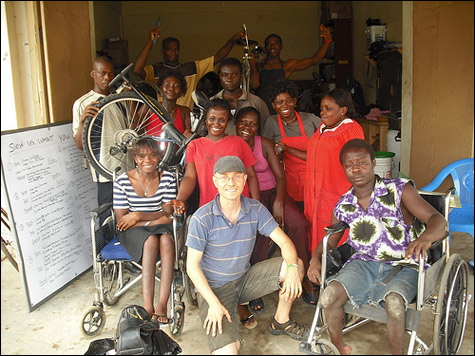
HANDLEBARS AND HOPE: Bikes Not Bombs staffer David Branigan (kneeling at center) hopes his project can help bring independent livelihoods to the handicapped in Ghana. |
If you grew up, as I did, a privileged snot in a leafy suburb, chances are you took bikes for granted. For me, they were a novelty method of transportation, brought out only when I felt like getting a little fresh air or exercise. No one I knew ever ran an errand on a bike.
But for some countries, bikes are considered indispensable. "In Ghana, average people earn something like 50 bucks a month," says Bikes Not Bombs (BNB) staffer David Branigan via Skype from Koforidua, in Ghana's eastern region. "It'll cost somebody possibly a dollar a day to take a car in and out of a city,"
"If you need to get to work, that already reduces your monthly salary by half. . . . A lot of the areas where people live are a bike trip away. It would save them tons of money."
Branigan has been in Koforidua since May, working to establish a retail bike shop with the help of BNB, a Jamaica Plain–based "peace through bicycles" nonprofit that recycles two-wheelers to aid both local and global communities. With their Ghana project, the idea is to provide bike-mechanic training to people with disabilities, and ultimately establish a cooperative store for the area. A local organization, the Emmanuel Education Foundation Sports Academy for the Physically Challenged (EEFSA), has also lent its support to the project. The EEFSA is headed by disabled Ghanaian athlete Emmanuel Yeboah, whose 380-mile bike trek through his country in 2001 to promote better treatment for its disabled population was made into a documentary. That film, Emmanuel's Gift (2005), will be screened at a BNB promotional event this week.
When Branigan arrived in Koforidua, there was no bike shop, no staff, and no bikes to sell. He started from scratch, scouting out locations for the workspace, and eventually found a prime spot in the center of town. The landlord, an admirer of Yeboah's, asked for 10 years rent up front. Quite a commitment, but Branigan took the plunge.
To help pay off debt, the shop has relied on bikes donated from BNB and other organizations in the US, which are shipped to Ghana, where they are collected and then transported by Branigan and his associates to the shop in Koforidua. The Koforidua bike crew sells these bikes in bulk to local bike repairers. When picking up one of these shipments in July, Branigan was exposed to some of the corruption that is widespread throughout the African nation, an experience he recounted on the blog he devotes to his travels (bikesnotbombs-eefsa.blogspot.com). Looking at the paperwork, his EEFSA associate Hilda frowned when she noticed it was marked "hold." Apparently, the shipping company workers have a bad habit of intentionally delaying a customer's paperwork — in hopes someone will show up with cash to speed along the process. Knowing this, Hilda offered a small bribe.
Branigan selected six trainees for the shop in September — two salespeople, four mechanics.
The hope is that the trainees will one day be able to run the shop themselves. But, according to Branigan, there is still a long way to go. Just as our nation currently has no timetable for leaving Iraq, neither does Branigan have one for the West African nation.
"I don't mind that it takes a little longer as long as it's done right, says Branigan. "So that when it does register as an independent business, then it'll be sustainable because the people who are running it know what they're doing."
A screening of Emmanuel's Gift followed by a presentation by Bikes Not Bombs founder and international-programs director Carl Kurz will take place on Thursday, November 6, at 6:30 and 8:30 pm at City Year Headquarters, 287 Columbus Avenue, Boston. Tickets available for $7 to $15 online at bikesnotbombs.org, or, at the door for $15. Call 617.522.0222.